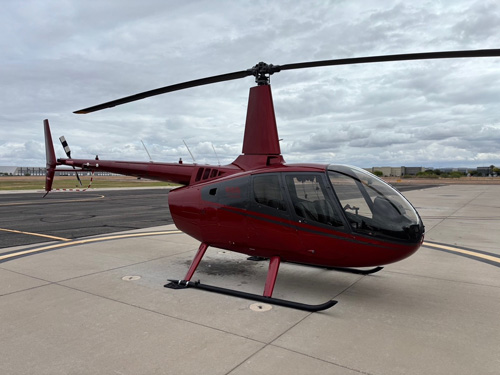Powerful, Efficient Performance

The Robinson R66 takes the proven R44 platform a step further with a 300-shp Rolls-Royce RR300 turboshaft engine, delivering turbine power in a package that weighs less than a piston-powered R44. Cruise at 110 kt (127 mph), climb at 1,000 fpm, and fly up to 325 nm (375 mi) on standard fuel—all with a dedicated 300-lb baggage compartment large enough for four full-size suitcases.
The R66 delivers turbine power without turbine expense. Its RR300 burns about 23 gph of readily available Jet A, provides instant, smooth throttle response. A streamlined drivetrain, crash-resistant fuel system, and global parts support keep downtime and hourly costs far below those of legacy light turbines.
Versatility is built in. A five-seat cabin, air-conditioning, and Garmin avionics make the R66 ideal for executive and charter operations, personal transportation, while options such as a certified cargo hook, pop-out floats, and NVG-ready lighting adapt it for utility, EMS, and law-enforcement missions. When you need turbine capability without turbine overhead, the R66 is the adaptable solution.
Key Features
- Enhanced Payload & Capacity – Seats five and includes a separate baggage compartment.
- Turbine Power & Performance – Rolls-Royce RR300 engine delivers strong climb rates, high cruise speeds, and excellent hot-and-high performance.
- Simplified Engine Maintenance – Fewer moving parts and longer maintenance intervals mean less downtime.
- Smooth Ride & Comfort – A spacious cabin and reduced vibration levels enhance passenger comfort.
- Proven Reliability – Built to Robinson’s rigorous standards and trusted worldwide for diverse missions.
Technical Highlights
- Engine: Rolls-Royce RR300 (~300 shp, derated)
- Seats: 5 (including pilot)
- Max Gross Weight: 2,700 lb (1,225 kg)
- Cruise Speed: up to 110 knots (127 mph / 204 km/h)
- Range: ~325 nm (602 km)
- Fuel Capacity: 73.6 gallons (278 liters) usable
- Baggage Capacity: ~300 lb (136 kg)
Performance will vary based on load, altitude, and weather. Use the Robinson Pilot’s Operating Handbook for all decisions relating to aircraft performance.
